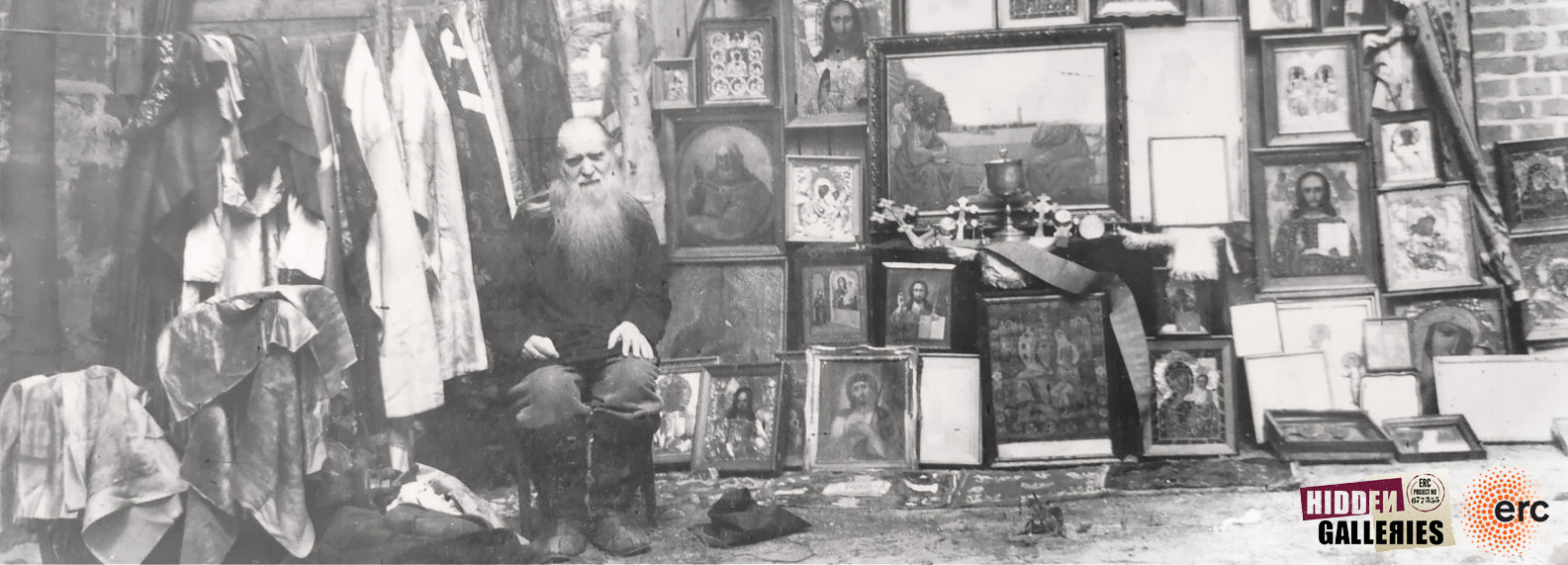Historical Archives of the Hungarian State Security
Item set
Title
Historical Archives of the Hungarian State Security
Állambiztonsági Szolgálatok Történeti Levéltára (ÁBTL)
Description
1. History of Foundation
The Historical Archives of the Hungarian State Security (Állambiztonsági Szolgálatok Történeti Levéltára, ÁBTL) is a state-owned special Archives founded in 2003 as the successor institution to the Historical Office. The Historical Office was established in 1997 by an Act of Parliament as a way of satisfying demands supported by the Constitutional Court for people to have access to their secret police files and in response to the need to give the process of vetting people standing for public office, also known as lustration, a constitutional legality.
2. Legal Commission and Task
The Historical Archives houses the documents of the former Hungarian State Security Organs dating from December 21, 1944 to February 14, 1990 and has the following tasks: to ensure the exercise of the right to the familiarization with their personal data for those represented in the documents of the state security police; to provide data to the organizations performing fact-finding as part of the lustration process, and to ensure the pursuit of the research activity in the archives as well as conducting and publishing research on the post-war organization and operation of the political police in Hungary and its relationship to the Communist Party, governmental organs and public security authorities as well as engaging in public educational activities.
3. Material relevant to the study of religion under communism
The archival material in the Historical Archive is divided into five sections (Section 1. Documents of State Security (State Defence) Organizations and their operations 1945-90; Section 2. State security documents that do not belong to any organizational entity 1945-90; Section 3. Network, operative and investigation files 1945-90; Section 4. Collections 1944-2007; Section 5. Documents after the year 1990 1994-2005). For the the study of religion Section 3, the largest section of the archive containing investigation files, operation files, work files and enlisting files is the most important. Apart from work files collecting all reports given by individual informers, all file types contain various document types from case summaries to evaluations, action plans, handwritten or transcribed confessions, interrogation minutes, transcripts of tapped conversations, surveillance reports and confiscated materials (letters, books, manuscripts, pamphlets, images, photographs of confiscated objects). Operation and investigation files are diverse sources of visual and material religious items, while other file types mostly contain textual information on religious activities. The archive has rich material on dissenting groups within the established churches, especially the Roman Catholic Church and the activities of officially unrecognised small churches and religious communities.
4. Other online resources containing materials on religion from ÁBTL:
The Historical Archives of the Hungarian State Security (Állambiztonsági Szolgálatok Történeti Levéltára, ÁBTL) is a state-owned special Archives founded in 2003 as the successor institution to the Historical Office. The Historical Office was established in 1997 by an Act of Parliament as a way of satisfying demands supported by the Constitutional Court for people to have access to their secret police files and in response to the need to give the process of vetting people standing for public office, also known as lustration, a constitutional legality.
2. Legal Commission and Task
The Historical Archives houses the documents of the former Hungarian State Security Organs dating from December 21, 1944 to February 14, 1990 and has the following tasks: to ensure the exercise of the right to the familiarization with their personal data for those represented in the documents of the state security police; to provide data to the organizations performing fact-finding as part of the lustration process, and to ensure the pursuit of the research activity in the archives as well as conducting and publishing research on the post-war organization and operation of the political police in Hungary and its relationship to the Communist Party, governmental organs and public security authorities as well as engaging in public educational activities.
3. Material relevant to the study of religion under communism
The archival material in the Historical Archive is divided into five sections (Section 1. Documents of State Security (State Defence) Organizations and their operations 1945-90; Section 2. State security documents that do not belong to any organizational entity 1945-90; Section 3. Network, operative and investigation files 1945-90; Section 4. Collections 1944-2007; Section 5. Documents after the year 1990 1994-2005). For the the study of religion Section 3, the largest section of the archive containing investigation files, operation files, work files and enlisting files is the most important. Apart from work files collecting all reports given by individual informers, all file types contain various document types from case summaries to evaluations, action plans, handwritten or transcribed confessions, interrogation minutes, transcripts of tapped conversations, surveillance reports and confiscated materials (letters, books, manuscripts, pamphlets, images, photographs of confiscated objects). Operation and investigation files are diverse sources of visual and material religious items, while other file types mostly contain textual information on religious activities. The archive has rich material on dissenting groups within the established churches, especially the Roman Catholic Church and the activities of officially unrecognised small churches and religious communities.
4. Other online resources containing materials on religion from ÁBTL:
5. Access for Researchers
Researchers can apply to become an accredited researcher with access to the reading room by following the application process outlined under the Reading Room heading:
Creator
Agnes Hesz and Kinga Povedák
Publisher
This project has received funding from the European Research Council (ERC) under the European Union’s Horizon 2020 research and innovation programme No. 677355
Date Created
January 2021
Items
-
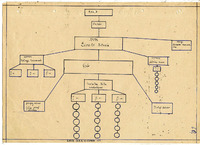
Network scheme of Hungarian Catholic underground cells
This network scheme is from a file on a Hungarian Catholic underground movement. Hand drawn and sketchy, it is a less sophisticated version of its more elaborate and detailed – and sometimes almost artistically executed – Soviet and Romanian counterparts. The purpose of network schemes was to map the connections of groups or individuals; in this case it shows the people István Divald, a young Piarist monk recruited to the Catholic underground movement lead by György Bulányi. Amongst the recruits we find a canon, three parish priests and a catechism teacher from three settlements in north-weste -
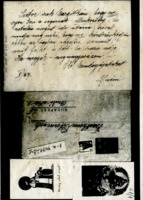
Confiscated letter and religious images from Hungary
The image comes from a documentary file on the former leaders of KLOSZ (National Confederation of Catholic Girls), a Hungarian Catholic youth organisation, which was by that time, like other civil organisations, dissolved by law. It shows an intercepted letter, an envelope and two religious images. The message on the card is rather enigmatic: "I’m writing hastily, my dear Margit, asking Gizi not to write to our brother-in-law – on the contrary, if she happens to come here, she should tell him not to make any inquiries in this matter for now, – and he should also return what he had noted down – -

Smuggled Catholic holy card Hungary
This is a picture of a confirmation holy card by artist Maria Spötl (1898-1953). The holy card depicts a confirmation with a bishop giving a blessing to a praying young boy. On the lower part of the holy card we find the following text: “Megbérmállak téged …….hogy Krisztus katonája légy az ördög, a bűn, a tévedés és gúny ellen. Győznöd kell, hogy megkapjad az élet koronáját.” “I confirm you ………..to be the soldier of Christ against the devil, sin, deception and scorn. You have to be victorious to receive the crown of life.” The "VMS" abbreviation below the picture stands for Verlag Maria Spö -
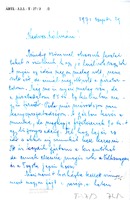
Cryphtographic letters written by a Hungarian Baptist minister
In this image we see cryptographic letters written by agent ‘Géza Szebeni’. This was not his real name but his secret service pseudonym. The first image is of the visible “cover letter” which masks the cryptographic letter shown here in the second image, while the third image is the decoded transcript of the cryptographic letter. The letters were created using a cryptographic technique that allows the writer to hide the important message underneath a decoy message containing inane and useless information. In this case, the cover letter resembles friendly correspondence such as family iss -
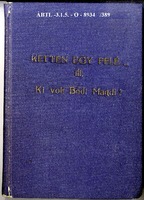
Hungarian religious samizdat on the life of Magdi Bódi
The first image depicts the cover of the samizdat book entitled Ketten egy felé… III. Ki volt Bódi Magdi (Two towards one… III. Who was Magdi Bódi?). The second image is the inside cover of the book with the text: Ketten egy felé… Szent Goretti Mária és Bódi Magdi utja. 1956, Karácsonyán. – Kézirant gyanánt.- (Two towards one… The life of St. Maria Goretti and Magdi Bódi. 1956, Christmas. -As manuscipt). The third image is a photograph of Magdi Bódi from the book with the caption below the image reading “Fűzfő angyala”, “The Angel of Fűzfő.” The last image is of page 204 of the confiscated bo -
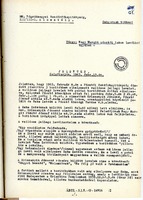
Secret police analysis of typewritten religious letters Hungary
These images show the pages of a secret police report on an investigation concerning three letters with religious content. The letters were addressed to a candidate for the local Member of Parliament and the municipal council’s president of a small town in northern Hungary and were posted locally. They contain various religious narratives and a short section about the funeral of Pál Jávor, a famous Hungarian actor. The report comes from a documentary file titled “Religious sects” in Nógrád county which mainly deals with Baptist communities (belonging to an officially acknowledged free church) -
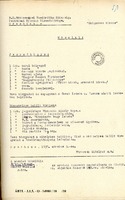
List of confiscated items from Church of Turan Believers of One God
The image shows a typewritten copy of a list of confiscated items that were taken from the home and workshop of Mihály Virasztó during a house search on 5 March 1957. He was a former member and táltos (ritual specialist) of the Church of the Turan Believers of One God. The list contains several items that are directly linked to the group: a “turan stamp”, a “turul” stamp (turul is a mythological bird used as a national symbol in modern Hungary), a book of ceremony, a book written by the groups founder, Zoltán Bencsi, and various copies of “Turanist journals”, possibly referring to the radical -
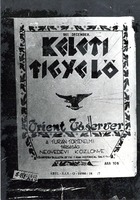
Intercepted materials from Church of Turan Believers of One God Hungary
These images have been selected from the photo-documentation of materials sent by post to Mihály Virasztó, a former religious specialist of the Church of the Turan Believers of One God. The first photo shows the cover page of the Keleti Figyelő [Orient Observer], the short-lived journal of the Turáni Történelmi Társaság [Turan Historical Society] founded by immigrant Hungarians in Melbourne, Australia. The second photo shows a certificate of honorary membership of Mihály Virasztó for supporting the study of Hungarian history, issued by the same society in 1962. The images come from a documenta -
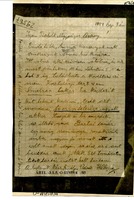
Letter about clandestine catechism classes Budapest
The image shows the photocopy of a handwritten letter from Budapest, September 1954, recommending a cathecism teacher who gave clandestine classes to children. Written on a piece of checkered paper the letter provides precise information about when and where to contact this person. It also contains instructions on how to get to the location of the meeting, a private flat. The visit of the person addressed in the letter, a doctor’s wife who was looking for a religious teacher for her daughters, was already expected by the catechism teacher, who had been notified of her intentioned visit. Near t -
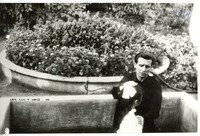
Confiscated photographs from a clandestine religious community Budapest
These images were confiscated from an underground Pentecostal community in Budapest-Pesterzsébet in 1972. The first image depicts a baptism where pastor József Németh is baptising a young girl. The second image is a group-picture of pastor József Németh and another five congregants in white who had just been baptised. They are standing with presumably other congregants and family members. The third image depicts pastor József Németh preaching to his congregation in their hidden house church. Prior to confiscation, the photos belonged to pastor József Németh. The photos were taken by a mem -
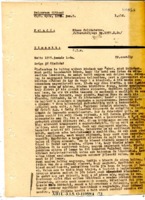
Letter about a secret Roman Catholic home christening Budapest
This word-for-word transcript of a typewritten personal letter tells about a secret home christening held in Budapest in December 1954. Amongst other deeply personal matters, the author, the child’s grandmother, briefly reports about the baptism. From this we learn that the child was baptised by a Piarist monk in the presence of the extended family, altogether 22 people. For the occasion the child’s grandfather erected a makeshift altar. As the letter-writer notes, he "made a beautiful altar. He made it so exceptionally nice that everybody was weeping with emotion. My entire home looked like a -
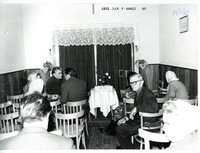
Crime scene photographs of a raid of a hidden house church Budapest
These pictures have been selected from the 27 crime scene photographs that were taken during a raid of pastor József Németh's community in a hidden house church created. The raid took place on September 26th, 1972 during a regular Tuesday gathering. The first photograph depicts the hidden house church in József Németh’s house in Pesterzsébet. On the picture we see nine congregants some of whom are facing the occasional table-alter, discussing the unfolding situation, others are turning towards the back of the room in order to follow events. Behind the alter, the double doors are covered with -
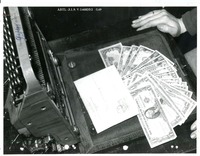
Evidence of illegal activity of underground Catholic religious order Hungary
This picture depicts a Continental typewriter confiscated during a house search of a Hungarian Cistercian monk, Dr. Ferenc Piusz Halász (1909-1994) in 1961. The typewriter was photographed along with illegally held US dollars. Three photo images were taken by the secret agents in order to show how the US dollars were hidden in an envelope inside the typewriter. On the reverse of the photograph we find the following text: "Elismerem, hogy a fotokópia hátoldalán látható dollár az én tulajdonomat képezte, illetve azonos azzal a négyszázkilencvenhét dollárral, melyet a fotokópia hátoldalán látha
